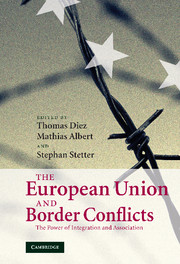Book contents
- Frontmatter
- Contents
- List of tables
- Notes on contributors
- Acknowledgements
- List of abbreviations
- Introduction
- 1 The transformative power of integration: conceptualising border conflicts
- 2 The influence of the EU towards conflict transformation on the island of Ireland
- 3 Catalysis, catachresis: the EU's impact on the Cyprus conflict
- 4 Transforming the Greek–Turkish conflicts: the EU and ‘what we make of it’!
- 5 Border issues in Europe's North
- 6 The EU and the Israel–Palestine conflict
- 7 The EU as a ‘force for good’ in border conflict cases?
- Conclusion
- References
- Index
4 - Transforming the Greek–Turkish conflicts: the EU and ‘what we make of it’!
Published online by Cambridge University Press: 22 September 2009
- Frontmatter
- Contents
- List of tables
- Notes on contributors
- Acknowledgements
- List of abbreviations
- Introduction
- 1 The transformative power of integration: conceptualising border conflicts
- 2 The influence of the EU towards conflict transformation on the island of Ireland
- 3 Catalysis, catachresis: the EU's impact on the Cyprus conflict
- 4 Transforming the Greek–Turkish conflicts: the EU and ‘what we make of it’!
- 5 Border issues in Europe's North
- 6 The EU and the Israel–Palestine conflict
- 7 The EU as a ‘force for good’ in border conflict cases?
- Conclusion
- References
- Index
Summary
Introduction
Greek–Turkish relations, in many ways, provide a fruitful case for scholars interested in the EU's role in the transformation of border conflicts. First of all, it is a case where the impact of the EU is widely mentioned, but not yet comprehensively and systematically studied (Rumelili 2004a). Secondly, because the EU has been a factor in Greek–Turkish relations since the early 1970s, the case contains many useful insights about the historical evolution of the EU's role as a ‘perturbator’ of conflicts, and the conditions under which the EU can positively impact border conflicts. There is a clear puzzle in the EU involvement in Greek–Turkish conflicts: up until the late 1990s, the EU failed to have a positive impact. Countering the links made between European integration and peace, Greek–Turkish conflicts multiplied and intensified as Greece and Turkey developed closer institutional relations with the EU. However, clearly since 1999, we observe a promising rapprochement between Turkey and Greece within the EU context (Rumelili 2003a; 2004a). How the role of the EU changed from an additional forum for Greek–Turkish rivalry to a foundation for Greek–Turkish reconciliation is a very interesting empirical question that contains valuable insights for understanding the conditions for successful EU involvement in border conflicts.
This chapter will argue that the positive impact of the EU on Greek–Turkish relations has been realised through a complex interaction between domestic and EU-level conditions.
- Type
- Chapter
- Information
- The European Union and Border ConflictsThe Power of Integration and Association, pp. 94 - 128Publisher: Cambridge University PressPrint publication year: 2008
- 8
- Cited by



